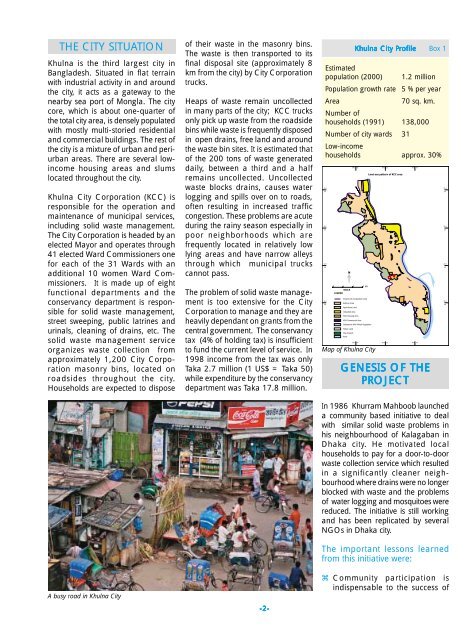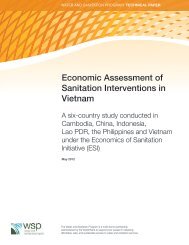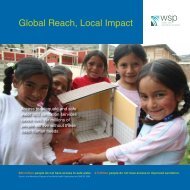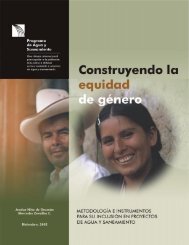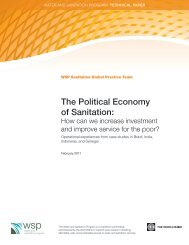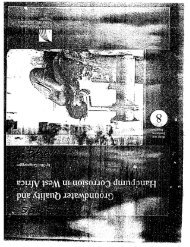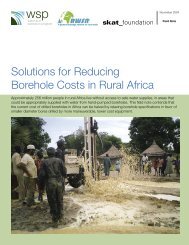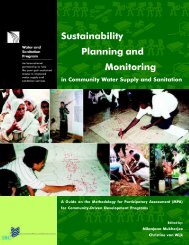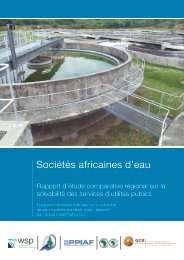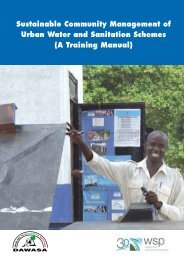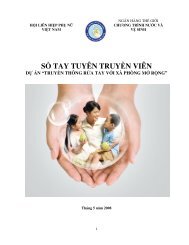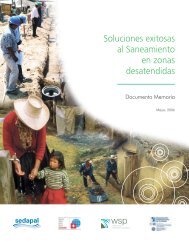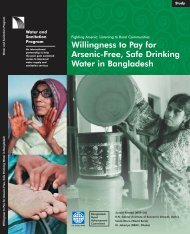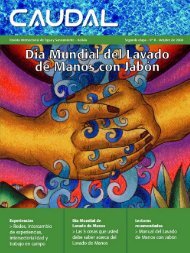Community Based Pilot Project on Solid Waste Management ... - WSP
Community Based Pilot Project on Solid Waste Management ... - WSP
Community Based Pilot Project on Solid Waste Management ... - WSP
Create successful ePaper yourself
Turn your PDF publications into a flip-book with our unique Google optimized e-Paper software.
THE CITY SITUATION<br />
Khulna is the third largest city in<br />
Bangladesh. Situated in flat terrain<br />
with industrial activity in and around<br />
the city, it acts as a gateway to the<br />
nearby sea port of M<strong>on</strong>gla. The city<br />
core, which is about <strong>on</strong>e-quarter of<br />
the total city area, is densely populated<br />
with mostly multi-storied residential<br />
and commercial buildings. The rest of<br />
the city is a mixture of urban and periurban<br />
areas. There are several lowincome<br />
housing areas and slums<br />
located throughout the city.<br />
Khulna City Corporati<strong>on</strong> (KCC) is<br />
resp<strong>on</strong>sible for the operati<strong>on</strong> and<br />
maintenance of municipal services,<br />
including solid waste management.<br />
The City Corporati<strong>on</strong> is headed by an<br />
elected Mayor and operates through<br />
41 elected Ward Commissi<strong>on</strong>ers <strong>on</strong>e<br />
for each of the 31 Wards with an<br />
additi<strong>on</strong>al 10 women Ward Commissi<strong>on</strong>ers.<br />
It is made up of eight<br />
functi<strong>on</strong>al departments and the<br />
c<strong>on</strong>servancy department is resp<strong>on</strong>sible<br />
for solid waste management,<br />
street sweeping, public latrines and<br />
urinals, cleaning of drains, etc. The<br />
solid waste management service<br />
organizes waste collecti<strong>on</strong> from<br />
approximately 1,200 City Corporati<strong>on</strong><br />
mas<strong>on</strong>ry bins, located <strong>on</strong><br />
roadsides throughout the city.<br />
Households are expected to dispose<br />
A busy road in Khulna City<br />
of their waste in the mas<strong>on</strong>ry bins.<br />
The waste is then transported to its<br />
final disposal site (approximately 8<br />
km from the city) by City Corporati<strong>on</strong><br />
trucks.<br />
Heaps of waste remain uncollected<br />
in many parts of the city; KCC trucks<br />
<strong>on</strong>ly pick up waste from the roadside<br />
bins while waste is frequently disposed<br />
in open drains, free land and around<br />
the waste bin sites. It is estimated that<br />
of the 200 t<strong>on</strong>s of waste generated<br />
daily, between a third and a half<br />
remains uncollected. Uncollected<br />
waste blocks drains, causes water<br />
logging and spills over <strong>on</strong> to roads,<br />
often resulting in increased traffic<br />
c<strong>on</strong>gesti<strong>on</strong>. These problems are acute<br />
during the rainy seas<strong>on</strong> especially in<br />
poor neighborhoods which are<br />
frequently located in relatively low<br />
lying areas and have narrow alleys<br />
through which municipal trucks<br />
cannot pass.<br />
The problem of solid waste management<br />
is too extensive for the City<br />
Corporati<strong>on</strong> to manage and they are<br />
heavily dependant <strong>on</strong> grants from the<br />
central government. The c<strong>on</strong>servancy<br />
tax (4% of holding tax) is insufficient<br />
to fund the current level of service. In<br />
1998 income from the tax was <strong>on</strong>ly<br />
Taka 2.7 milli<strong>on</strong> (1 US$ = Taka 50)<br />
while expenditure by the c<strong>on</strong>servancy<br />
department was Taka 17.8 milli<strong>on</strong>.<br />
-2-<br />
Khulna City Profile<br />
Box 1<br />
Estimated<br />
populati<strong>on</strong> (2000) 1.2 milli<strong>on</strong><br />
Populati<strong>on</strong> growth rate 5 % per year<br />
Area<br />
70 sq. km.<br />
Number of<br />
households (1991) 138,000<br />
Number of city wards 31<br />
Low-income<br />
households approx. 30%<br />
Map of Khulna City<br />
GENESIS OF THE<br />
PROJECT<br />
In 1986 Khurram Mahboob launched<br />
a community based initiative to deal<br />
with similar solid waste problems in<br />
his neighbourhood of Kalagaban in<br />
Dhaka city. He motivated local<br />
households to pay for a door-to-door<br />
waste collecti<strong>on</strong> service which resulted<br />
in a significantly cleaner neighbourhood<br />
where drains were no l<strong>on</strong>ger<br />
blocked with waste and the problems<br />
of water logging and mosquitoes were<br />
reduced. The initiative is still working<br />
and has been replicated by several<br />
NGOs in Dhaka city.<br />
The important less<strong>on</strong>s learned<br />
from this initiative were:<br />
! <str<strong>on</strong>g>Community</str<strong>on</strong>g> participati<strong>on</strong> is<br />
indispensable to the success of


